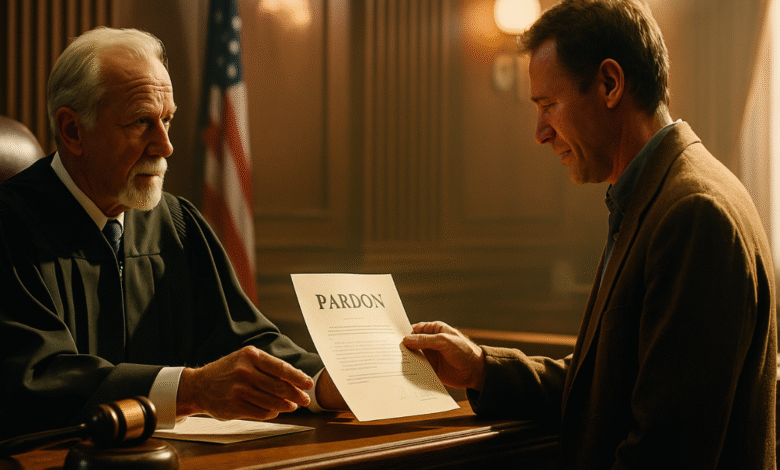Pardon Meaning: Understanding Its Depth and Everyday Use

Discover the true meaning of pardon, its legal, cultural, and everyday uses. Learn how pardon shapes conversations, justice systems, and forgiveness in society.
Introduction to Pardon Meaning
The word pardon is one of those terms that carries weight far beyond its simple spelling. At first glance, it seems straightforward—something we say when we didn’t hear someone clearly or when we accidentally bump into them. Yet the pardon meaning extends into law, history, religion, and even interpersonal relationships. Understanding it means looking at it not only as a polite word but as a concept tied to forgiveness and authority.
When we casually say pardon me in daily conversations, it feels light and almost effortless. But in a courtroom, when a president or governor issues a pardon, it changes the entire life of a person who has been convicted of a crime. This duality makes the term fascinating. On one hand, it’s humble and conversational, and on the other, it is powerful and transformative.
The Everyday Use of Pardon
In our daily interactions, pardon is often used as a polite interruption. It’s a word that softens conversations. Instead of bluntly saying what?, people often say pardon me? to ask for clarification. It signals respect and prevents the exchange from sounding rude. This everyday pardon meaning helps maintain civility in language.
For example, in British English, the phrase I beg your pardon is a classic expression. While sometimes used sarcastically, it generally implies formality and good manners. Similarly, in American English, pardon me is still used, though people more often say excuse me. Despite regional differences, the essence remains the same: it reflects courtesy and humility.
Interestingly, pardon also comes up when apologizing for minor mishaps. If someone sneezes in a meeting, saying pardon me acknowledges the disruption while keeping the flow intact. These small social gestures might feel ordinary, but they are rooted in centuries of etiquette and politeness.
Historical Roots of Pardon
The origins of the word pardon can be traced back to Latin. Derived from perdonare, which means “to give wholeheartedly” or “to forgive,” the term traveled through Old French (pardun) before entering English. The original pardon meaning was deeply tied to forgiveness—spiritual and personal.
In medieval Europe, pardon was not just about speech. It was also associated with indulgences in the Catholic Church. Pilgrims would receive a pardon for sins through rituals or charitable acts. This historical background shows that the term was never just about manners—it carried moral and religious authority.
The weight of the word grew when monarchs and rulers began using it as a legal tool. Kings granted pardons to criminals, effectively rewriting justice. This early use cemented the word’s dual identity: one for daily politeness, another for life-changing authority.
Pardon in Legal Context
When talking about the law, pardon takes on its most serious form. A legal pardon is an official act by a person in power—such as a president, monarch, or governor—that forgives someone for a crime and removes legal penalties. This aspect of pardon meaning is not about politeness but about justice, mercy, and authority.
For instance, in the United States, the Constitution grants the President the power to pardon federal offenses. This authority has been used throughout history, sometimes sparking controversy. While some see pardons as a chance to correct injustices, others criticize them as tools of political favoritism. Yet no matter the perspective, the power of a pardon cannot be ignored—it has the ability to alter lives completely.
In many other countries, the practice is similar. Monarchs, prime ministers, or heads of state hold the ability to grant pardons. These acts often symbolize mercy and reconciliation, especially after wars or social upheavals. Thus, the pardon meaning in law reflects the delicate balance between authority and compassion.
Pardon as Forgiveness
Beyond the courtroom and daily manners, pardon also represents the act of forgiveness. To pardon someone means to let go of resentment or anger toward them. This emotional dimension of pardon meaning connects it to human psychology and spirituality.
When someone says, I pardon you, they are choosing to release negative feelings. Forgiveness does not necessarily erase the wrongdoing, but it allows healing. Religious traditions, especially Christianity, emphasize the act of pardoning others as a path toward inner peace. Similarly, in Islamic and Buddhist teachings, pardon is seen as a moral strength, not a weakness.
In everyday life, pardoning a friend or family member often repairs bonds that might otherwise break. It prevents bitterness from growing. In this sense, pardon is less about authority and more about humanity—choosing compassion over conflict.
Cultural Interpretations of Pardon
The pardon meaning also changes depending on culture. In some societies, pardon is heavily tied to honor and reputation, while in others, it’s a casual word used daily without much thought.
For example, in French, pardon is commonly used to mean sorry or excuse me. People use it in crowded streets, shops, and conversations. In English-speaking cultures, the use of pardon is considered more formal, while excuse me has taken over in casual settings.
In Asian cultures influenced by Confucian principles, pardon often relates more to hierarchy and respect. Using polite words like pardon me can signal acknowledgment of authority or seniority. This cultural angle shows how one word can shift its tone depending on social values.
Pardon in Literature and Religion
Writers and poets have long explored the theme of pardon. From Shakespeare to modern authors, forgiveness is a central plot element. Characters who seek pardon often embody humility and redemption. For instance, Shakespeare’s plays frequently use the phrase I do entreat your pardon as a mark of dignity.
Religious texts also emphasize pardon as a divine gift. In Christianity, believers pray for God’s pardon through confessions and prayers. In Islam, the act of seeking Allah’s pardon (astaghfirullah) is a common practice. These traditions highlight the sacredness of forgiveness, making the pardon meaning not just linguistic but spiritual.
Such portrayals in literature and religion keep the concept alive across generations, reminding us of its deeper value beyond etiquette and law.
Pardon vs. Excuse

Although pardon and excuse are often used interchangeably, their nuances differ. To pardon is to forgive or absolve, while to excuse is to justify or explain. This subtle difference adds another layer to the pardon meaning.
When you excuse someone, you are allowing their behavior by understanding the reason behind it. For example, excuse my lateness, there was traffic. But when you pardon someone, you acknowledge the wrongdoing but choose to forgive. A pardon carries more gravity and finality compared to an excuse.
This difference may seem minor in casual speech, but in deeper discussions, it matters. Excusing can sometimes downplay accountability, while pardoning addresses it head-on.
Modern Relevance of Pardon
In today’s world, the pardon meaning continues to evolve. With social media, political debates, and cultural shifts, the word remains in the spotlight. Presidential pardons make headlines, sparking heated discussions about justice and fairness.
At the same time, the everyday use of pardon me is declining in some regions, replaced by less formal alternatives. Yet the value of pardon as forgiveness remains timeless. In relationships, workplaces, and communities, the ability to pardon can ease tensions and build stronger connections.
This duality makes the word both modern and eternal—a bridge between polite speech and profound moral choice.
Table: Different Shades of Pardon Meaning
| Context | Meaning of Pardon | Example Usage |
|---|---|---|
| Daily Conversation | Polite way to ask for repetition or apologize | Pardon me, could you repeat that? |
| Legal | Official forgiveness of crimes | The governor issued a pardon. |
| Emotional | Forgiveness of personal wrongs | She pardoned him for the betrayal. |
| Religious | Spiritual absolution and mercy | Praying for God’s pardon. |
| Cultural | Courtesy shaped by regional traditions | French people often say “pardon.” |
Quotes on Pardon
“To err is human; to forgive, divine.” – Alexander Pope
“Pardon is the fragrance that the violet sheds on the heel that has crushed it.” – Mark Twain
These quotes illustrate how thinkers and writers view pardon not just as an act but as a symbol of human strength.
Frequently Asked Questions (FAQs)
Q1: What is the simple pardon meaning?
The simple meaning of pardon is to forgive or excuse someone, whether in daily life or in legal contexts.
Q2: How is pardon different from excuse?
Pardon focuses on forgiveness and letting go of resentment, while excuse is more about giving a reason or justification for behavior.
Q3: What does it mean when a president gives a pardon?
It means the president is granting official forgiveness for a federal crime, removing penalties but not necessarily erasing guilt.
Q4: Is saying “pardon me” polite?
Yes, it is considered a formal and courteous way to interrupt or ask someone to repeat themselves.
Q5: Does pardon always mean forgiveness?
Not always. In some contexts, especially casual speech, it can simply mean excuse me rather than deep forgiveness.
Conclusion
The pardon meaning is richer than it appears. From daily manners to presidential authority, from religious absolution to personal forgiveness, the word covers multiple dimensions of human life. It shows that language is not just about words but about values—respect, mercy, and compassion. Whether whispered in an apology or announced as a legal decree, pardon reminds us of the power of forgiveness and the importance of civility.





